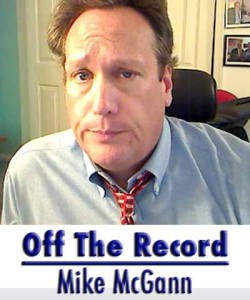Hostile attitude toward business growth must change to fix tax problem
By Mike McGann, Editor, The Times
 You’ll excuse my sense of de ja vu.
You’ll excuse my sense of de ja vu.
Back in my youth as a young reporter, the hot catch phrase for the overbuilt and tax-revenue challenged northern New Jersey suburbs was “ratables.”
Ratables are a very special kind of real estate: they use little in the way of local or school district services, pay taxes and the best ones create lots of local jobs to spark the local economy. They are the polar opposite of the single-family home, in terms of taxes versus services.
I remember mentioning the need to encourage “ratables” during one or another political campaign and people mostly looked at me like I had three heads. Of course, and this still may be true, a lot people think that by building a lot of single-family homes, the local tax base goes up and taxes should go down.
Notwithstanding the fact that each and every single family home uses about 1.5 times in services relative to the amount of taxes they pay (obviously if you have kids, the multiple is much higher, lower if you don’t — one figure I saw suggested you need as many as 25 years of local school taxes on average to pay for your one kid to go through the system), suffice it to say that letting Toll Brothers run amuck in Chester County hasn’t improved the real estate tax issue.
Since we can’t unwind sprawl, what then?
In short, promote commercial and light industrial development.
Obviously, the effort that the Chester County Economic Development Partners Initiative outlines this past week is a good start. While there’s no need to make Chester County look like Marcus Hook, there’s little argument that the county needs ratables and clearly needs more good-paying jobs. Leveraging the county’s geographical location should be a “no brainer.”
Should be.
But a major hurdle is that too many townships in the county treat business and business development like it is a dirty word. Instead of finding ways streamline processes to welcome new business and grow existing ones, local government and local residents throw up barriers and are out-and-out hostile to such concepts. That’s at the cost of jobs and creating a better, more sustainable tax base for our communities and schools.
You know things are way out of kilter when a person once publicly described as “a left-wing California liberal” (thank you, State Rep. Steve Barrar) now finds himself wondering whether he’s awoken in Berkeley on the Brandywine — and recently found himself (on these very pages) described as some sort of capitalist stooge for defending commercial growth.
That would be me. I plead guilty to the capitalist charge. I’m a small businessman and have owned corporate stock since I was eight years old and began reading The Wall Street Journal.
I like business. I like making money.
What I don’t understand is the seeming lack of enthusiasm that so many municipalities and residents seem to have to others doing so.
If there’s a common theme (and yes, there are exceptions — but sadly they’ve been just that, exceptions) its watching municipalities throw up barrier after barrier to businesses relocating or expanding in Chester County. It shouldn’t take a year to get a building permit to renovate an existing building without changing its footprint. Millions of dollars of tax revenue and hundreds of jobs shouldn’t be held hostage because some local official won’t work with a developer. Similar behavior came within a hair’s breadth of sending a large warehouse and distribution operation — owned by one of the county’s most socially responsible companies, by the way — to North Carolina instead of southern Chester County.
I could go on, but it seems like overkill. I have to think in this highly competitive atmosphere word is going to get out, if it hasn’t already, “don’t bother with Chester County. They don’t like business there.”
So you might be saying, “so what? I have a good job. What do I have to lose?”
Plenty.
Unless you love high school and county taxes, you lose there. And when a county has a healthy and growing economy, one that is growing jobs, everyone benefits. Everyone’s business (yes, mine too) does better. House prices begin to rise again.
Don’t get me wrong, I love open space. I love clear air and water. But if all we build in Chester County are houses — and eventually the building boom will reignite — we will be buried in clogged up roads and high taxes, without the local jobs to support our local economy.
We might all be caught up in the presidential race this year — but elections that may have more impact on you and the future of our county happen in 2013 with municipal elections. You may not know who your supervisors, commissioners or council members are, but find out — some of them are running for reelection in 2013. Ask them “what are you doing to create jobs and grow our local economy?”
If they can’t answer that question, it might be time to find some new elected officials.
* * *
There poorly designed, poor implemented legislation and then there’s Pennsylvania’s Act 1.
You may know it as the 2006 law that governs how much your school taxes can be increased. It was supposed to take the burden off local property taxpayers and limit growth of schools spending.
But like the pension reform legislation of 2001 — you know, the one that’s caused a multi-billion dollar hole in the pension fund — it suffers from unintended consequences.
You see, Act 1 mandates a limit on the rate, not the total levy. And while in a booming economy (okay, back last century) with property values steadily increasing, it was a workable cap, maybe. But property values have fallen and property owners continue to appeal their property assessments and win, the net value of real estate continues to drop in Chester County.
As an example, Kennett Consolidated School District has lost some $4 million in tax revenue over the last four years. But Act 1 doesn’t take that into account.
The legislature and then-Gov. Ed Rendell didn’t foresee a time when property values might drop (although it was already a common issue in urban locales). Just like with the pension changes, they (OK, it was then-Gov. Tom Ridge, proving that the Pennsylvania state government can be short-sighted in a heartwarmingly bipartisan manner) didn’t see the stock market tanking, either.
Faced with this issue what did your pals in the state legislature do? Fix this obvious oversight? Nope. They moved Act 1 to a three-year moving average — great for the first year of an economic downturn, lousy for the first couple years (like now) as the economy gets better.
And yes, another legislative session has passed without doing anything meaningful (or anything, actually) about the pension mess, charter reform and so on.
Makes you feel all warm and fuzzy inside about the idea of sending your local legislator — one who is among the highest paid in the nation — back for another session in Harrisburg, doesn’t it?








Well…uh…Bush had eight years to do something about it (and the housing market boomed for the first five years of the Bush Admin — so that doesn’t make much sense) and didn’t, if you’re right (which is dubious). Who’s to say Romney is going to do any better…he seems to have all the same advisors as Bush…so basically youre argument seems to be liberals bad, republicans good, but are unable to back it up with facts or anything beyond bluster.
Here’s how history will remember it: The Community Reinvestment Act, inflicted on America by Carter and double-downed on by Cinton, with the help of Frank & Dodd, destroyed the housing maket in America and caused it’s collapse. This Lib scheme/attempt to redistribute property/wealth is the foudation of our current great-recession.
Gosh Ray, you’re right.
We all remember that explosive economic expansion from 2001 to 2008, right?
Ronald Reagan made history 3 times in regards to taxation & revenue:
He resided over the largest Income-tax decrease (cut) and tax code simplification in our history.
The 20+ million jobs this helped create generated the largest increase in revenue to the Govt we have ever seen.
Econ 101: Yes, cutting income taxes drove the free market to hire more people and increase the number of people paying taxes (broaden the base).
Reagan’s distractors will say he was a tax increaser, but this is tripe. This is like saying a good Doctor is a “killer” because he didn’t save all of his patients. Reagan did raise some ancillary taxes, user fees, and got rid of some deductions but on the whole, his aggregate record is that of a masive tax cutter/reformer which unleashed the free market to historical levels.
And another thing, government jobs are a drag on an economy. The trash heap of fiscal disasters is a fueled by Keynesian schemes of government spending. For example: for every new govt job (public sector), it requires 5 private sector jobs to be created to generate the tax base to pay for the pay and benefits for each of these new govt jobs.
One other thought, Ray.
If you were a student of history, you know this:
Each economic boom in the last 70 plus years has been preceded by a tax increase. Starting with the biggest stimulus package ever, World War II. High taxes in the 1950s didn’t stop a boom — only when Kennedy cut taxes did things stall. Reagan cut taxes in the 1980s, and the economy stalled. When he raised them, boom. Clinton raised taxes in 1993 and the economy took off. Bush cut them and the economy tanked.
Just food for thought.
C’mon Ray, to you 85 percent of the population is the left. We need jobs and we need to cut government regulations that are pointless. And yes, we do have a revenue problem: as countries in Europe are finding out, austerity is slowing down their economies and worsening their deficits, not improving them. We’ve shot ourselves in the foot here, too, on economic improvement by cutting so many public-sector jobs.
Do me a favor and look up Coolidge and Hoover and how that worked out. You’re basically advocating a return to those policies.
We do need cuts but we also need to undo the Bush Tax Cuts which dug a giant hole. We need to cool it on defense spending, and we need to cut government waste. You scream about the left, but it was the Right that dug the big financial hole and now all you folks do is cry about how Obama hasn’t fixed it fast enough. He might not be a great or even good president but he’s not the disaster that Bush was and seems to have a core set of beliefs unlike Romney who seems to change day to day…if he had just on position, I might vote for him, because I’m not thrilled with Obama, but everyday he’s saying something different…I’m not up for President Sybil.
The Left will never get it. We don’t have a revenue problem, we have a spending problem. Special interest labor laws and our crony patronage political system confluence to drown the forgotten citizen taxpayer. It’s time for local media outlets to spout-off about the real drivers of our financial woes.
Actually, Act 1 is an excellent piece of legislation. It has held down real estate tax increases while still allowing sufficient funds to provide an excellent education to our students.
.
The editor laments the loss of “$4 million in tax revenue over the last four years” through assessment appeals. This is a bit misleading. One might think that the Kennett District has had to make due with less each year – like many of us. Not so! The District, over that same time period, has been able to increase the tax rate thus collecting an additional $12M in Local Revenue. Would an extra $4M added to the $12M have made things easier? Yes, but with a weak economy, with worker salaries stagnant and with most retirees living on fixed incomes, Act 1 is doing exactly what is needed – keeping tax increases at a reasonable level.
Reference page 63 of http://www.kcsd.org/pdf/2012-13-final-budget.pdf
.
To work within the strictures imposed by Act 1, the school directors are doing exactly what is needed – looking for new sources of revenue, cutting where appropriate and being careful with the terms of the new teacher contract which determines over 50% of the budget.